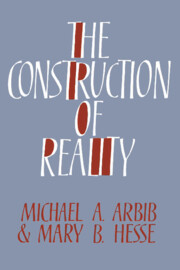Book contents
- Frontmatter
- Contents
- Preface
- Chapter 1 Posing the problem
- Chapter 2 The intelligence of the artificial
- Chapter 3 Schema theory
- Chapter 4 Relating mind and brain
- Chapter 5 Freedom
- Chapter 6 Freud on psychology and religion
- Chapter 7 Schemas: from the individual to the social
- Chapter 8 Language, metaphor, and a new epistemology
- Chapter 9 Interpretation and reality
- Chapter 10 Religions as social schemas
- Chapter 11 The Great Schema
- Chapter 12 Secular schemas
- References
- Author index
- Subject index
Chapter 10 - Religions as social schemas
Published online by Cambridge University Press: 22 September 2009
- Frontmatter
- Contents
- Preface
- Chapter 1 Posing the problem
- Chapter 2 The intelligence of the artificial
- Chapter 3 Schema theory
- Chapter 4 Relating mind and brain
- Chapter 5 Freedom
- Chapter 6 Freud on psychology and religion
- Chapter 7 Schemas: from the individual to the social
- Chapter 8 Language, metaphor, and a new epistemology
- Chapter 9 Interpretation and reality
- Chapter 10 Religions as social schemas
- Chapter 11 The Great Schema
- Chapter 12 Secular schemas
- References
- Author index
- Subject index
Summary
Religion as primitive science
Our discussion of hermeneutics and critical theory has led to this question: What are the constraints and criteria for the success of social schemas? A schema theory of many-leveled interactions between the individual and the social may provide the mechanism of schema correction and development, but it cannot by itself specify the social functions that the feedback systems serve, nor the consciously adopted goals that human beings intentionally feed into these systems. Guided missiles have externally specified targets, and homeostatic biological systems have a goal of survival, ensured by natural selection mechanisms. What are the goals of social systems?
There are three possible types of answer to this question, which we call scientistic, hermeneutic, and critical. Scientism is the view that the criteria for the success of social schemas can be read off the facts without intervention of any but scientific criteria. This view recognizes that facts in themselves do not entail human judgments of good and bad, but it claims that these judgments cen be elicited from deep natural structures of human biology, psychology, and social interaction. These structures can be described and explained, for instance, in the science of evolution and by natural scientific methods applied to the social sciences. The model for such a scientistic interpretation of social norms, therefore, tends to be biological science, in which the goals of feedback schemas are patent: functional coherence, stability, and survival.
- Type
- Chapter
- Information
- The Construction of Reality , pp. 197 - 221Publisher: Cambridge University PressPrint publication year: 1986

